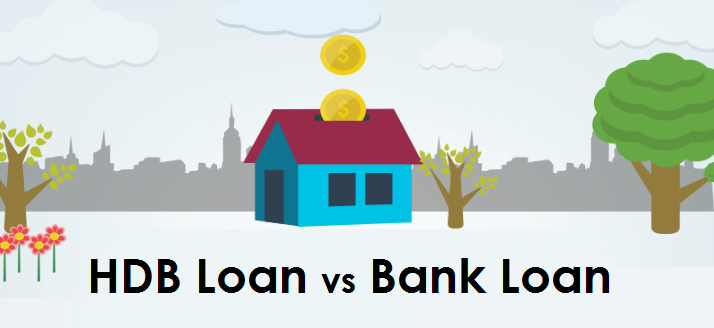So now that you’ve decided on getting a flat for you and your partner, what’s next?
Choosing between a bank loan or a HDB loan, of course.
In this article, we discuss these two loans in bite-sized pieces of information.
HDB Loan
Housing in Singapore is often far from cheap, even for HDB flats. Our government enthusiastically tries to help its citizens make purchasing a home easier. It does this through the HDB loan, a scheme that offers financing for Singaporeans.
Eligibility Conditions
You can’t take a HDB loan unless you satisfy these basic requirements:
- Can only be used for HDB flats, whether new or resale
- Minimum of one buyer must be a Singapore citizen
- Combined household income must not exceed $12,000, or $18,000 for extended families
- Buyers must not possess any private property in Singapore and overseas
- Buyers must not have 2 or more HDB concessionary interest rate loans
- Must use up all the money in your CPF Ordinary Account
Bank Loan
A bank loan has fewer restrictions. You don’t have to wipe clean the money in your CPF Ordinary Account before being granted the loan.
There is no income ceiling either, so even if you’re earning a million dollars a month, you can still apply for it. Interest rates are usually fixed to the Singapore Interbank Offered Rate (SIBOR) or the Swap Offered Rate (SOR).
Comparing Both Loans
| Factors | HDB Loan | Bank Loan |
| Interest Rate | 2.6% | SIBOR + 1% spread |
| Downpayment | 5% with Staggered Downpayment Scheme | Minimum of 5% of property price in cash |
| Loan to Value | Up to 90% | Up to 80% |
| Repayment Amounts | Consistent | Fluctuates |
| Early Repayment | No penalties | 1.5% – 1.75% |
| Late Repayment | 7.5% p.a. | $50/late repayment |
Interest Rate
On the outside, it looks as if the bank loan offers lower interest rates. However, rates can fluctuate. The same interest rate you’re paying today will differ in 3 to 5 years, so don’t rejoice too soon.
Let’s not forget that there’s a 1% spread that the bank takes as profit. This spread is likely to increase after 3 years.
Depending on the prevailing SIBOR or SOR rates, it can also be cheaper or costlier. Conversely, the HDB loan’s rate is usually fixed at 2.6%, as evidenced by its unchanging 16-year average.
If you’re a simple-minded person who dislikes complicated situations, then the HDB loan may be the one for you. Banks have an extensive selection of loan packages, which can easily confuse the average buyer.
Downpayment
Thanks to HDB’s Staggered Downpayment Scheme, you don’t have to fork out all of the 10% down payment immediately. Instead, you can choose to give 5% upfront when you sign the lease agreement, and the rest when you get your keys 3-5 years later.
The downpayment for HDB loans are usually taken from your CPF account, and if the funds are insufficient, the balance will be paid in cash.
For bank loans, expect at least 5% of the 20% initial down payment to be paid in cash. That means that if your funds are insufficient, your CPF cannot save you either. Therefore, if you’re on a tight budget, consider the HDB loan instead.
Repayment
Reflecting the variable interest rate of bank loans, the repayment amounts are likewise inconsistent. You can expect to make fixed repayments for a few years before it changes.
Additionally, every time you refinance your loan, there may be financing costs incurred. If you like to take risks, then you may want to choose the bank loan.
On the other hand, the HDB loan is consistent, as it’s dependent on the CPF rate. It changes as often as the government changes its ruling party. So, if you hate biting your nails worrying over the rate yearly, take the HDB loan.
Being consistent also means that you know exactly how much to put aside each month. Your finances become easy to count and maintain. Additionally, your employer contributes a fixed percentage to your CPF account monthly, so that’s another win for the HDB loan since you’re paying lesser.
Early Repayment
If you attempt to pay off your loan early within the commitment period, you have to pay for it (literally).
I know what you’re thinking: pay early also need to have penalty ah?
Of course – where else do banks get a significant amount of income from, if not the interest rates of loans?
For HDB loans, there is no penalty, so you may want to opt for it if you don’t want the possibility of incurring extra fees. Effectively, paying off your loan faster means that you end up paying less interest. Who wouldn’t want to?
Late Repayment
If you make late repayments, of course you’ll need to pay a penalty – just look at the loan sharks.
However, as compared to the bank loan, it’s easier to negotiate for the HDB loan.
Conclusion
Although it’s pretty obvious that we’re rooting for the HDB loan, it really depends on your risk appetite and situation. If you like lower risk and greater assurance, then pick the HDB loan. If you are a risk taker, and you know the market well, the bank loan may work out to be better for you.

